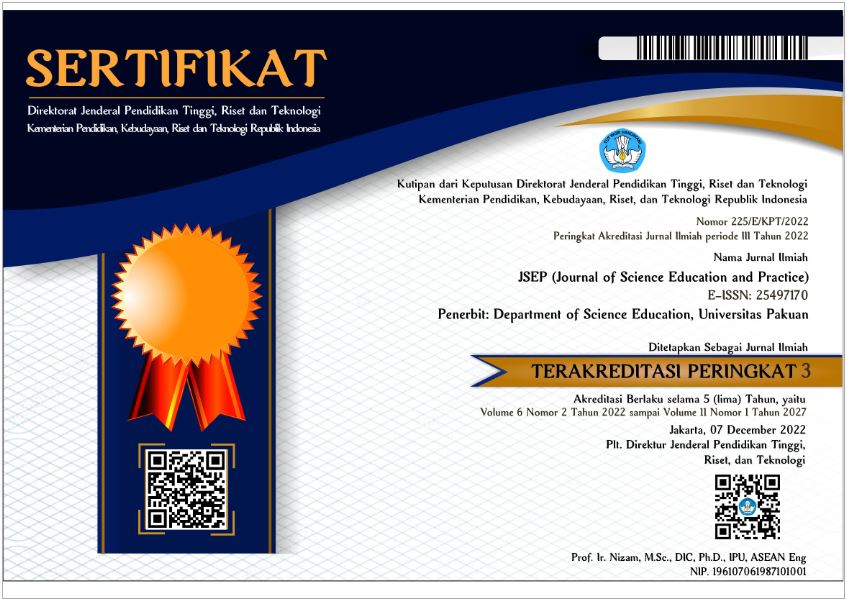ADDITIONAL MENU
DEVELOPMENT OF WEBSITE-BASED E-MODULE LEARNING MEDIA TO IMPROVE STUDENTS SCIENCE LITERACY ON EXCRETORY SYSTEM MATERIAL
Abstract
Keywords
References
Fuadi, H., Robbia, A. Z., Jamaluddin, J., & Jufri, A. W. (2020). Analisis Faktor Penyebab Rendahnya Kemampuan Literasi Sains Peserta Didik. Jurnal Ilmiah Profesi Pendidikan, 5(2), 108–116.
Hidayat, F., & Nizar, M. (2021). Model Addie (Analysis, Design, Development, Implementation and Evaluation) dalam Pembelajaran Pendidikan Agama Islam. Jurnal Inovasi Pendidikan Agama Islam (JIPAI), 1(1), 28–38.
Hutahaean, L. A., Siswandari, & Harini. (2019). Pemanfaatan E-Module Interaktif Sebagai Media Pembelajaran di Era Digital. Prosiding Seminar Nasional Teknologi Pendidikan Pascasarjana UNIMED, 298–305.
Karnando, R. R., & Sugiarti, L. (2023). Development of Web-Based Physics Learning E-Module to Improve Science Literacy. Berkala Ilmiah Pendidikan Fisika, 11(1), 104–115.
Kurniawati, F. N. A. (2022). Meninjau Permasalahan Rendahnya Kualitas Pendidikan Di Indonesia dan Solusi. Academy of Education Journal, 13(1), 1–13.
Laili, I., Ganefri, & Usmeldi. (2019). Efektivitas Pengembangan e-Modul Project Based Learning Pada mata Pelajaran Instalasi Motor Listrik. Jurnal Imiah Pendidikan dan Pembelajaran, 3(3), 306–315.
Nadira, N., Lodang, H., & Wiharto, M. (2022). Uji Validitas Pengembangan E-Modul Materi Ekosistem sebagai Sumber Belajar Biologi pada Kelas X SMA. Oryza Jurnal Pendidikan Biologi, 11(2).
Nofiana, M., & Teguh, J. (2018). Upaya Peningkatan Literasi Sains Siswa Melalui Pembelajaran Berbasis Keunggulan Lokal. Jurnal Tadris Pendidikan Biologi, 9(1), 24–35.
PISA. (2018). Insights and Interpretations. OECD Publishing: Paris.
Qoridatullah, A., Sholeh, H., Ajat, S. (2021). Pengembangan E-Modul Berorientasi Higher Order Thinking Skills (Hots) Pada Pelajaran Ilmu Pengetahuan Alam (IPA) Kelas VI Sekolah Dasar. Jurnal Muara Pendidikan, 6(1), 33–40.
Rifqi, A. B. (2021). Pengaruh Implementasi Asesmen Projek Terhadap Karakter dan Literasi Sains Siswa Kelas IV SD Gugus 2 Kecamatan Buleleng. Jurnal Pendidikan Dasar Flobamorata, 2(1), 96–102.
Rilanty, N., & Tita, J. (2020). Pengembangan Media Pembelajaran Berbasis Website untuk Meningkatkan Hasil Belajar Siswa pada Materi Kesetimbangan Kimia. Jurnal Inovasi Pembelajaran Kimia, 2(1), 36–40.
Salsabila, W., Rita, I & Rifki R, M. (2024). Pengembangan E-Modul Berbasis Guided Inquiry Terintegrasi Nilai Keislaman pada Materi Sistem Reproduksi untuk Meningkatkan Kemampuan Pemecahan Masalah. Jurnal BIOEDUIN, 14(1), 38–49.
Setianingsih, S & Nelmiawati, N. (2020). Penyerapan Informasi Masyarakat Terhadap Media Informasi Dinas Kominfo Kota Batam Studi Kasus Pembuatan Kartu Pencari Kerja Online. Journal of Applied Multimedia and Networking, 4(1).
Shinta, S., Fatmawati, S & Nasir, M. (2020). Komparasi Model Problem Based Learning dan Discovery Learning Terhadap Hasil Belajar Ditinjau dari Kemampuan Awal. Kappa Journal, 4(1).
Sugiyono. (2019). Metode Penelitian Kuantitatif, Kualitatif, dan R&D. Bandung: Alfabeta.
Sujana, E., Saputra, K & Manurung, D. (2020). Internal Control System and Good Village Governance to Achieve Quality Village Financial Reports. International Journal of Inovation, Creativity and Change, 12(9).
Sunami, M. A., & Aslam. (2021). Pengaruh Penggunaan Media Pembelajaran Video Animasi Berbasis Zoom Meeting terhadap Minat dan Hasil Belajar IPA Siswa Sekolah Dasar. Jurnal Basicedu, 5(4), 1940–1945.
Syamsiani. (2022). Transformasi Media Pembelajaran Sebagai Penyalur Pesan. CENDEKIA: Jurnal Ilmu Sosial, Bahasa Dan Pendidikan, 2(3), 35–44.
Taştan, S. B., Seyed, M., Alfiya, M., & Alexandr, B. (2018). The Impacts of Teachers Efficacy and Motivation on Students Academic Achievement in Science Education Among Secondary and High School Students. Eurasia Journal of Mathematics, Science and Technology Education, 14(6), 2353–2366.
Wahab, A., Junaedi, & Azhar. (2021). Efektivitas Pembelajaran Statistika Pendidikan Menggunakan Uji Peningkatan N-Gain di PGMI. Jurnal Basicedu, 5(2), 1039–1045.
Widayati, J. R., Rien, S., & Yeti, S. (2020). Analisis Pengembangan Literasi Sains Anak Usia Dini Melalui Alat Permainan Edukatif. Jurnal Obsesi : Jurnal Pendidikan Anak Usia Dini, 5(1), 654–664.
DOI: 10.33751/jsep.v9i1.11497
 Abstract views : 124
Abstract views : 124
Refbacks
- There are currently no refbacks.
Copyright (c) 2025 JOURNAL OF SCIENCE EDUCATION AND PRACTICE

This work is licensed under a Creative Commons Attribution 4.0 International License.












